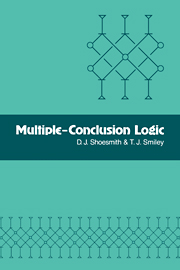Book contents
16 - Counterparts
Published online by Cambridge University Press: 06 July 2010
Summary
Many-valued counterparts
Since matrix evaluation is only a special case of the general method of characterising a calculus by means of a set of partitions, it follows as in Section 5.4 that when a calculus L is characterised by a matrix M, a set of formulae will be inconsistent in L iff it is unsatisfiable in M, i.e. iff there is no valuation which gives a designated value to every member of the set. For single-conclusion calculi there is no such general equivalence between inconsistency (of any kind) and unsatisfiability, as Theorem 5.25 shows, but we can establish one with respect to matrix evaluation in all but one anomalous case:
Theorem 16.1 If a consistent single-conclusion calculus L is characterised by a matrix M, a set of formulae is formally inconsistent in L iff it is unsatisfiable in M.
Proof If L is consistent, M has an undesignated value a. Let p be any variable, and let s be a substitution based on a one-one mapping of the set of all variables onto those other than p. If there is a valuation v which satisfies X, let v′ be such that v′(p)=a and v′(s(q)) = v(q) for every variable q. Then v′ invalidates (s(X),p), and hence and X is not formally inconsistent. Conversely if X is not formally inconsistent then s(X) ⊬ B for some s and B, and so some valuation v invalidates 〈s(X),B〉, whence vs satisfies X.
- Type
- Chapter
- Information
- Multiple-Conclusion Logic , pp. 283 - 296Publisher: Cambridge University PressPrint publication year: 1978



